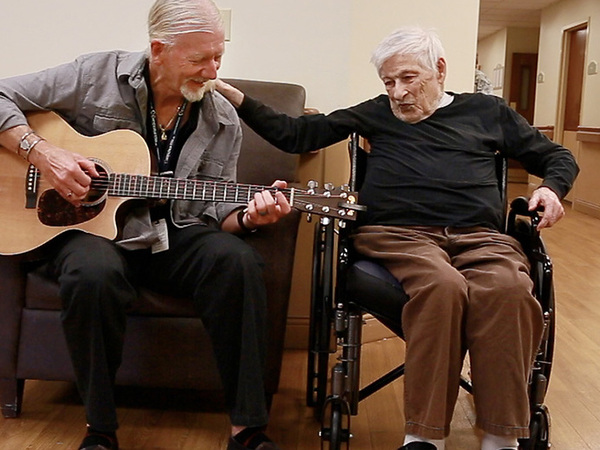
Music enables Dennis Zimmerman to make healing connections with patients and families.
It is time to make my chaplain visit. Lizzie (not her real name) is lying in bed. Her eyes are closed. I knock gently on the door and, as she opens her eyes, a faint smile comes to her face.
“Oh, it’s you,” she says in greeting me. “Rosie and I are here to see you,” I reply. “Oh, good!” she says. “You brought your banjo.”
“Rosie” is my rosewood Martin guitar — not a banjo — and we have been visiting Lizzie for the last several weeks. Cancer has stolen her strength and ravaged her
body, but her spirit and her mischievous sense of humor are still there — hence, the “banjo” joke.
I know her favorites: “Jingle Bells” — at any time of the year — “Amazing Grace,” “Let Me Call You Sweetheart,” “Side By Side” and, of course, “You are My Sunshine.”
But why is a chaplain playing music? And not even religious music? Isn’t the chaplain’s domain word and sacrament, prayer and consolation?
Well, yes, but there are times when the “religious” aspects of the chaplain’s job actually get in the way of our primary responsibility: helping people cope with the spiritual aspects of death.
Fewer people are attending religious services and the ties people have to their religious roots are often stressed and even torn. As a result, more people are describing themselves as “spiritual, but not religious.”
I often hear from our nurses that new patients aren’t interested in having a “chaplain” visit but if they want to come and play music, that would be fine. Also, as people begin to decline, and speech and logic become impossible, words begin to lose their ability to communicate comfort and hope.
So, Rosie has become my partner in getting around the barriers of culture and disease. Alzheimer’s patients who haven’t said a coherent sentence for weeks will recognize the lyrics to familiar hymns and popular songs and try to sing along. Patients who don’t want any “religious nonsense” open up and talk about some meaningful event in their lives after hearing a song that reminds them of happier times. An impromptu singalong in a common area creates a sense of community and an escape from the sameness of nursing home life.
As a musician and chaplain I am not a “therapist” in any traditional sense of the word. “Therapist” comes from a Greek root that means “treatment” and is often translated as “cure.” Rosie and I do not cure anyone of anything. Rather, we are in the healing business.
“Heal” comes from a Greek root associated with wholeness and well-being, and that is what we try to provide — quality of life and well-being. Rosie and I try to connect people to the feelings, memories, hopes, regrets, people and places that have filled their lives with joy and meaning.
Rosie and I serve as a combination magic carpet and time machine as we transport people from their sick beds and reconnect them to important times and familiar faces. As this connection is made, the window to the spiritual — that which is indescribable, but real; that which links us to one another, to the past, to the future and to the eternal — is opened. Light streams. Breath flows. Years and burdens lift. Tears fall. Smiles break. Rhythm and melody carry us away.
Lizzie was tired out from my visit. I could see in her eyes she was glad I had come but that now she needed to rest. As I pack up, say my goodbyes and give a blessing, I see her sense of humor twinkling in her eyes.
“Thanks for the sunshine!” she grins.




